Weijie Liu
Small Generalizable Prompt Predictive Models Can Steer Efficient RL Post-Training of Large Reasoning Models
Feb 02, 2026Abstract:Reinforcement learning enhances the reasoning capabilities of large language models but often involves high computational costs due to rollout-intensive optimization. Online prompt selection presents a plausible solution by prioritizing informative prompts to improve training efficiency. However, current methods either depend on costly, exact evaluations or construct prompt-specific predictive models lacking generalization across prompts. This study introduces Generalizable Predictive Prompt Selection (GPS), which performs Bayesian inference towards prompt difficulty using a lightweight generative model trained on the shared optimization history. Intermediate-difficulty prioritization and history-anchored diversity are incorporated into the batch acquisition principle to select informative prompt batches. The small predictive model also generalizes at test-time for efficient computational allocation. Experiments across varied reasoning benchmarks indicate GPS's substantial improvements in training efficiency, final performance, and test-time efficiency over superior baseline methods.
ORBIT: On-policy Exploration-Exploitation for Controllable Multi-Budget Reasoning
Jan 13, 2026Abstract:Recent Large Reasoning Models (LRMs) achieve strong performance by leveraging long-form Chain-of-Thought (CoT) reasoning, but uniformly applying overlong reasoning at inference time incurs substantial and often unnecessary computational cost. To address this, prior work explores various strategies to infer an appropriate reasoning budget from the input. However, such approaches are unreliable in the worst case, as estimating the minimal required reasoning effort is fundamentally difficult, and they implicitly fix the trade-off between reasoning cost and accuracy during training, limiting flexibility under varying deployment scenarios. Motivated by these limitations, we propose ORBIT, a controllable multi-budget reasoning framework with well-separated reasoning modes triggered by input. ORBIT employs multi-stage reinforcement learning to discover Pareto-optimal reasoning behaviors at each effort, followed by on-policy distillation to fuse these behaviors into a single unified model. Experiments show that ORBIT achieves (1) controllable reasoning behavior over multiple modes, (2) competitive reasoning density within each mode, and (3) integration of these frontier policies into a single unified student model while preserving clear mode separation and high per-mode performance.
VI-MMRec: Similarity-Aware Training Cost-free Virtual User-Item Interactions for Multimodal Recommendation
Dec 09, 2025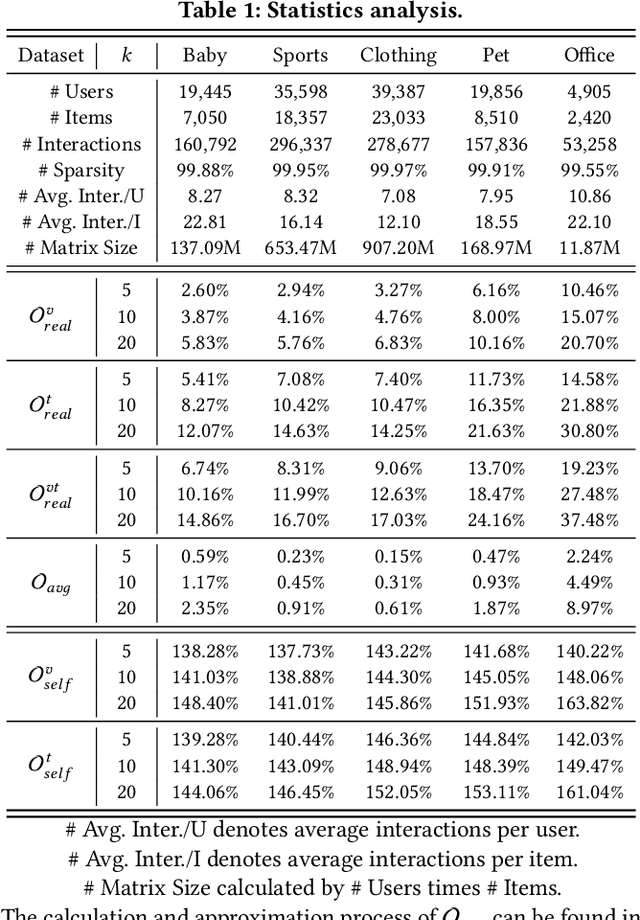
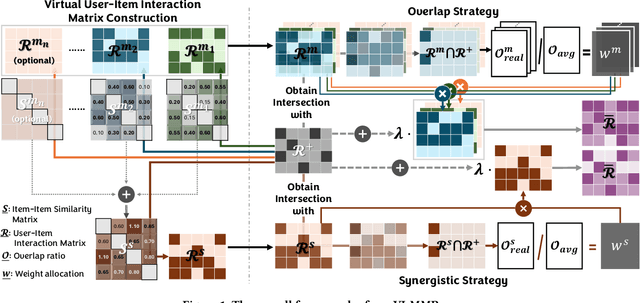

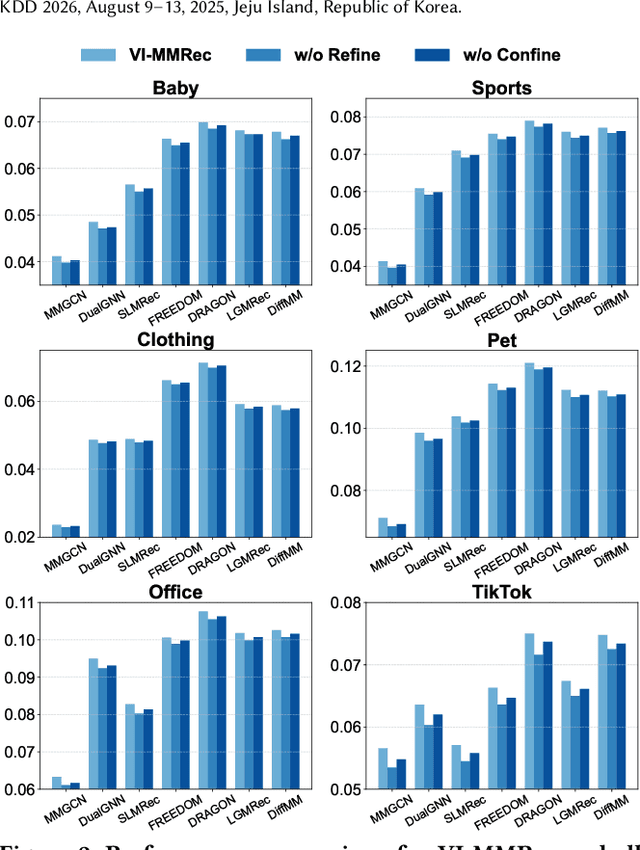
Abstract:Although existing multimodal recommendation models have shown promising performance, their effectiveness continues to be limited by the pervasive data sparsity problem. This problem arises because users typically interact with only a small subset of available items, leading existing models to arbitrarily treat unobserved items as negative samples. To this end, we propose VI-MMRec, a model-agnostic and training cost-free framework that enriches sparse user-item interactions via similarity-aware virtual user-item interactions. These virtual interactions are constructed based on modality-specific feature similarities of user-interacted items. Specifically, VI-MMRec introduces two different strategies: (1) Overlay, which independently aggregates modality-specific similarities to preserve modality-specific user preferences, and (2) Synergistic, which holistically fuses cross-modal similarities to capture complementary user preferences. To ensure high-quality augmentation, we design a statistically informed weight allocation mechanism that adaptively assigns weights to virtual user-item interactions based on dataset-specific modality relevance. As a plug-and-play framework, VI-MMRec seamlessly integrates with existing models to enhance their performance without modifying their core architecture. Its flexibility allows it to be easily incorporated into various existing models, maximizing performance with minimal implementation effort. Moreover, VI-MMRec introduces no additional overhead during training, making it significantly advantageous for practical deployment. Comprehensive experiments conducted on six real-world datasets using seven state-of-the-art multimodal recommendation models validate the effectiveness of our VI-MMRec.
EntroPIC: Towards Stable Long-Term Training of LLMs via Entropy Stabilization with Proportional-Integral Control
Nov 19, 2025Abstract:Long-term training of large language models (LLMs) requires maintaining stable exploration to prevent the model from collapsing into sub-optimal behaviors. Entropy is crucial in this context, as it controls exploration and helps avoid premature convergence to sub-optimal solutions. However, existing reinforcement learning methods struggle to maintain an appropriate level of entropy, as the training process involves a mix of positive and negative samples, each affecting entropy in different ways across steps. To address this, we propose Entropy stablilization via Proportional-Integral Control (EntroPIC), a novel method that adaptively adjusts the influence of positive and negative samples by dynamically tuning their loss coefficients. This approach stabilizes entropy throughout training, ensuring efficient exploration and steady progress. We provide a comprehensive theoretical analysis for both on-policy and off-policy learning settings, demonstrating that EntroPIC is effective at controlling entropy in large-scale LLM training. Experimental results show that our method successfully maintains desired entropy levels, enabling stable and optimal RL training for LLMs.
Think Outside the Policy: In-Context Steered Policy Optimization
Oct 30, 2025Abstract:Existing Reinforcement Learning from Verifiable Rewards (RLVR) methods, such as Group Relative Policy Optimization (GRPO), have achieved remarkable progress in improving the reasoning capabilities of Large Reasoning Models (LRMs). However, they exhibit limited exploration due to reliance on on-policy rollouts where confined to the current policy's distribution, resulting in narrow trajectory diversity. Recent approaches attempt to expand policy coverage by incorporating trajectories generated from stronger expert models, yet this reliance increases computational cost and such advaned models are often inaccessible. To address these issues, we propose In-Context Steered Policy Optimization (ICPO), a unified framework that leverages the inherent in-context learning capability of LRMs to provide expert guidance using existing datasets. ICPO introduces Mixed-Policy GRPO with Implicit Expert Forcing, which expands exploration beyond the current policy distribution without requiring advanced LRM trajectories. To further stabilize optimization, ICPO integrates Expert Region Reject Sampling to filter unreliable off-policy trajectories and Annealed Expert-Bonus Reward Shaping to balance early expert guidance with later autonomous improvement. Results demonstrate that ICPO consistently enhances reinforcement learning performance and training stability on mathematical reasoning benchmarks, revealing a scalable and effective RLVR paradigm for LRMs.
Do Not Step Into the Same River Twice: Learning to Reason from Trial and Error
Oct 30, 2025Abstract:Reinforcement learning with verifiable rewards (RLVR) has significantly boosted the reasoning capability of large language models (LLMs) recently. However, existing RLVR approaches merely train LLMs based on their own generated responses and are constrained by the initial capability of LLMs, thus prone to exploration stagnation, in which LLMs fail to solve more training problems and cannot further learn from the training data. Some work tries to address this by leveraging off-policy solutions to training problems but requires external guidance from experts which suffers from limited availability. In this work, we propose LTE (Learning to reason from Trial and Error), an approach hinting LLMs with their previously self-generated incorrect answers and problem of overlong responses, which does not require any external expert guidance. Experiments validate the effectiveness of LTE, which outperforms the normal group relative policy optimization (GRPO) by 6.38 in Pass@1 and 9.00 in Pass@k on average across six mathematics benchmarks for Qwen3-4B-Base. Further analysis confirms that LTE successfully mitigates the problem of exploration stagnation and enhances both exploitation and exploration during training.
Hunyuan-TurboS: Advancing Large Language Models through Mamba-Transformer Synergy and Adaptive Chain-of-Thought
May 21, 2025Abstract:As Large Language Models (LLMs) rapidly advance, we introduce Hunyuan-TurboS, a novel large hybrid Transformer-Mamba Mixture of Experts (MoE) model. It synergistically combines Mamba's long-sequence processing efficiency with Transformer's superior contextual understanding. Hunyuan-TurboS features an adaptive long-short chain-of-thought (CoT) mechanism, dynamically switching between rapid responses for simple queries and deep "thinking" modes for complex problems, optimizing computational resources. Architecturally, this 56B activated (560B total) parameter model employs 128 layers (Mamba2, Attention, FFN) with an innovative AMF/MF block pattern. Faster Mamba2 ensures linear complexity, Grouped-Query Attention minimizes KV cache, and FFNs use an MoE structure. Pre-trained on 16T high-quality tokens, it supports a 256K context length and is the first industry-deployed large-scale Mamba model. Our comprehensive post-training strategy enhances capabilities via Supervised Fine-Tuning (3M instructions), a novel Adaptive Long-short CoT Fusion method, Multi-round Deliberation Learning for iterative improvement, and a two-stage Large-scale Reinforcement Learning process targeting STEM and general instruction-following. Evaluations show strong performance: overall top 7 rank on LMSYS Chatbot Arena with a score of 1356, outperforming leading models like Gemini-2.0-Flash-001 (1352) and o4-mini-2025-04-16 (1345). TurboS also achieves an average of 77.9% across 23 automated benchmarks. Hunyuan-TurboS balances high performance and efficiency, offering substantial capabilities at lower inference costs than many reasoning models, establishing a new paradigm for efficient large-scale pre-trained models.
TACO: Tackling Over-correction in Federated Learning with Tailored Adaptive Correction
Apr 24, 2025Abstract:Non-independent and identically distributed (Non-IID) data across edge clients have long posed significant challenges to federated learning (FL) training in edge computing environments. Prior works have proposed various methods to mitigate this statistical heterogeneity. While these works can achieve good theoretical performance, in this work we provide the first investigation into a hidden over-correction phenomenon brought by the uniform model correction coefficients across clients adopted by existing methods. Such over-correction could degrade model performance and even cause failures in model convergence. To address this, we propose TACO, a novel algorithm that addresses the non-IID nature of clients' data by implementing fine-grained, client-specific gradient correction and model aggregation, steering local models towards a more accurate global optimum. Moreover, we verify that leading FL algorithms generally have better model accuracy in terms of communication rounds rather than wall-clock time, resulting from their extra computation overhead imposed on clients. To enhance the training efficiency, TACO deploys a lightweight model correction and tailored aggregation approach that requires minimum computation overhead and no extra information beyond the synchronized model parameters. To validate TACO's effectiveness, we present the first FL convergence analysis that reveals the root cause of over-correction. Extensive experiments across various datasets confirm TACO's superior and stable performance in practice.
Many-to-Many Matching via Sparsity Controlled Optimal Transport
Mar 31, 2025



Abstract:Many-to-many matching seeks to match multiple points in one set and multiple points in another set, which is a basis for a wide range of data mining problems. It can be naturally recast in the framework of Optimal Transport (OT). However, existing OT methods either lack the ability to accomplish many-to-many matching or necessitate careful tuning of a regularization parameter to achieve satisfactory results. This paper proposes a novel many-to-many matching method to explicitly encode many-to-many constraints while preventing the degeneration into one-to-one matching. The proposed method consists of the following two components. The first component is the matching budget constraints on each row and column of a transport plan, which specify how many points can be matched to a point at most. The second component is the deformed $q$-entropy regularization, which encourages a point to meet the matching budget maximally. While the deformed $q$-entropy was initially proposed to sparsify a transport plan, we employ it to avoid the degeneration into one-to-one matching. We optimize the objective via a penalty algorithm, which is efficient and theoretically guaranteed to converge. Experimental results on various tasks demonstrate that the proposed method achieves good performance by gleaning meaningful many-to-many matchings.
Hunyuan-Large: An Open-Source MoE Model with 52 Billion Activated Parameters by Tencent
Nov 05, 2024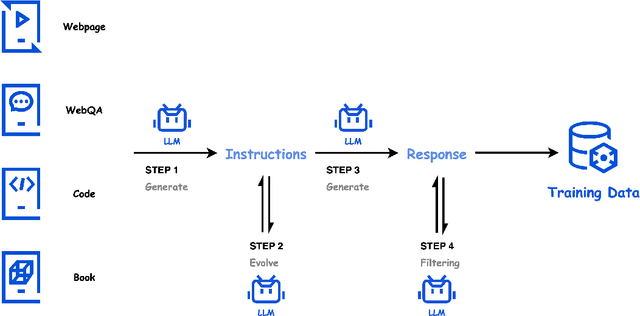
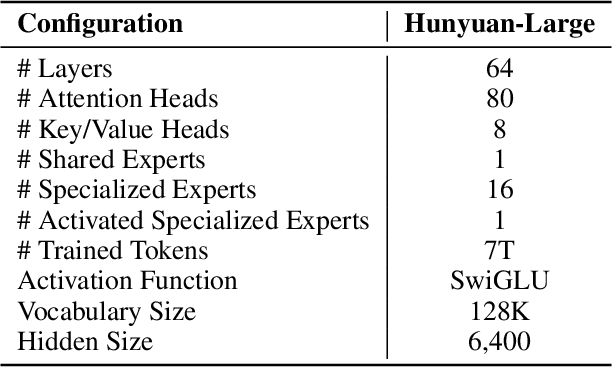
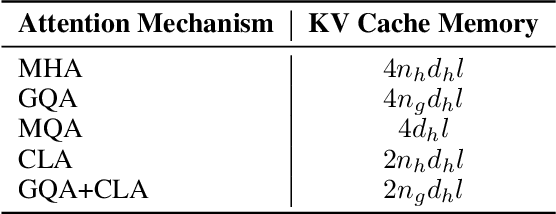
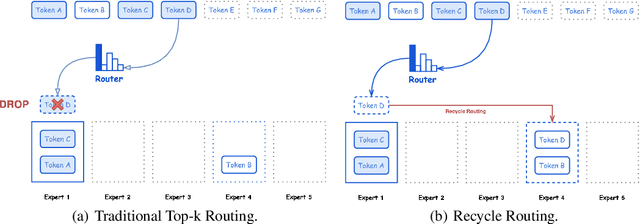
Abstract:In this paper, we introduce Hunyuan-Large, which is currently the largest open-source Transformer-based mixture of experts model, with a total of 389 billion parameters and 52 billion activation parameters, capable of handling up to 256K tokens. We conduct a thorough evaluation of Hunyuan-Large's superior performance across various benchmarks including language understanding and generation, logical reasoning, mathematical problem-solving, coding, long-context, and aggregated tasks, where it outperforms LLama3.1-70B and exhibits comparable performance when compared to the significantly larger LLama3.1-405B model. Key practice of Hunyuan-Large include large-scale synthetic data that is orders larger than in previous literature, a mixed expert routing strategy, a key-value cache compression technique, and an expert-specific learning rate strategy. Additionally, we also investigate the scaling laws and learning rate schedule of mixture of experts models, providing valuable insights and guidances for future model development and optimization. The code and checkpoints of Hunyuan-Large are released to facilitate future innovations and applications. Codes: https://github.com/Tencent/Hunyuan-Large Models: https://huggingface.co/tencent/Tencent-Hunyuan-Large
 Add to Chrome
Add to Chrome Add to Firefox
Add to Firefox Add to Edge
Add to Edge